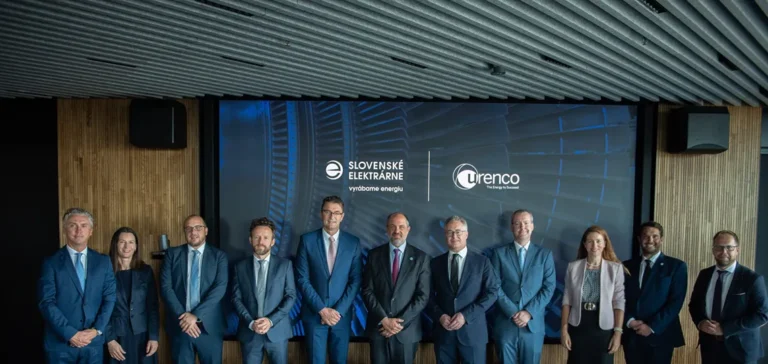Slovak electricity producer Slovenské elektrárne has finalised a contract with Urenco Group for the supply of enriched uranium for its Bohunice and Mochovce nuclear facilities. This agreement, effective until the middle of the next decade, follows an international tender launched in 2024 with the aim of diversifying the country’s supply sources and consolidating its energy security.
Strengthening Slovakia’s energy security
Slovakia currently operates five nuclear reactors with a combined capacity of 2.3 gigawatts, covering almost half of the country’s electricity production. A fourth reactor is under construction at the Mochovce site, marking a new stage in the development of the Slovak nuclear fleet. For Slovenské elektrárne, access to reliable and diversified enrichment services remains a strategic priority, as this stage is considered the most demanding both technologically and financially within the nuclear fuel cycle.
Branislav Strýček, Chairman and Chief Executive Officer of Slovenské elektrárne, indicated that this partnership with Urenco allows the company to diversify its business relations. He stated that this contract will contribute to the stable and safe operation of Slovak nuclear power plants.
Urenco’s entry into the Slovak market
Urenco Group, based in the United Kingdom, is thus establishing itself in a new market. Laurent Odeh, Chief Commercial Officer of Urenco, expressed the group’s commitment to supporting the energy security of countries by providing enrichment services for nuclear power plants. Urenco operates enrichment facilities in Germany, the Netherlands, the United Kingdom, and the United States.
Created in 1970 following the Treaty of Almelo, Urenco is equally owned by the British government, the Dutch government, and the German companies EOn and RWE AG. Its enrichment capacity, spread across several European and American sites, enables it to meet the demand of international clients, with Slovakia now joining that list.
A changing Slovak nuclear sector
The diversification of enriched uranium suppliers is part of a broader trend among European nuclear operators, who face growing challenges in securing supply chains. The contract with Urenco comes as Slovakia continues to modernise and expand its nuclear fleet. According to Slovenské elektrárne, control over the supply of enriched uranium ensures operational continuity and stable electricity production.
Recent developments in the Slovak nuclear sector and Slovenské elektrárne’s diversification strategy highlight the increasing importance of managing the fuel cycle, especially in a context of evolving international markets and a growing number of specialised enrichment providers.






















